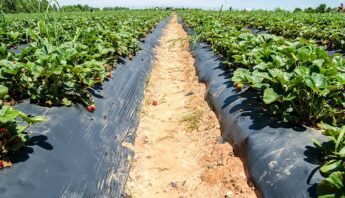It’s that time of year! Freshly scrubbed, nervous-looking kids don backpacks, pack lunches and head off to school.
This back-to-school season there’s both excellent and not-so-great news when it comes to schoolkids and pesticides. On balance, it’s fair to say there’s exciting progress afoot for children’s health — from pesticide-free school lunches to a nasty brain-harming chemical finally getting the boot.
No more “egregious” delays
First, the excellent news. That neurotoxic pesticide you’ve heard us talk about so often? It’s called chlorpyrifos, and while it’s not yet a done deal, it looks like the writing is on the wall for this chemical at long last.
Early in the summer, the Environmental Protection Agency (EPA) signaled that it’s finally considering pulling this widely used insecticide from the market, and that they would decide for certain by next April. Then last month, a judge ordered them to act sooner — by October 31, to be precise.
In a hard-hitting legal opinion, the judge called the agency’s inaction on chlorpyrifos “egregious.” She also took the agency to task for ignoring its own assessment of the dangers of chlorpyrifos to human health.
The hard deadline is very, very good news for schoolkids across the country. Chlorpyrifos has been linked to reduced IQs, changes in brain architecture and increased risk of autism and ADHD. In California, public health officials found it among the top 10 drift-prone pesticides used most often within a quarter mile of schools.
School lunch, hold the pesticides
In more excellent news, a school district in Northern California became the first in the country to serve an all-organic menu to its students. The meals will be prepared onsite by Conscious Kitchen, which develops school menus based on five principles: Fresh, local, organic, seasonal and non-GMO.
The great thing is, we know it’s doable. It turns out this program has already been in place for two years, and this is simply an expansion. The pilot program served 156 students at Bayside MLK Academy in Marin City for two years — and reported a drop in disciplinary problems, better attendance and a stronger sense of community.
Here’s Judi Shils, founding director of Turning Green, which worked Conscious Kitchen to put the program in place:
“Not only does this program far exceed USDA nutritional standards, but it ties the health of our children to the health of our planet. It’s the first program to say that fundamentally, you cannot have one without the other.”
Hear, hear! Hopefully, this success story will inspire school districts across the country to move toward healthier food. Meanwhile, if you’re curious about the pesticides that show up on fruits and veggies kids love — and their impacts on health — take a look at our “What’s On My Food” online database.
And now, the bad news. . .
Unfortunately, the not-so-good news is pretty darn bad. California officials decided in late August to continue the practice of “banking” use permits for the cancer-causing pesticide Telone. This means that if growers use less than the allowed amount of the chemical one season, they can roll it over to the following year.
Telone is used to fumigate the soil of strawberry fields, among other crops, and — along with chlorpyrifos — is one of the chemicals most often applied in close proximity to schools in California’s rural counties.
In timing that clearly underscores what’s at stake, state officials announced continuation of the rollover loophole just as children head back to school. Here’s Francisco Rodriguez, president of the Pajaro Valley Federation of Teachers, in a press statement on the issue:
“These unscientific and unsafe practices have put California children, especially Latinos, in harm’s way.”
PAN, along with concerned parents, teachers and others across the state are calling for a stop to Telone banking. Please join us in keeping the pressure on decisionmakers. Let’s keep making good news happen!
Take Action » Urge California decisionmakers to close the Telone loophole, and protect schoolkids across the state from this drift-prone, cancer causing chemical.








